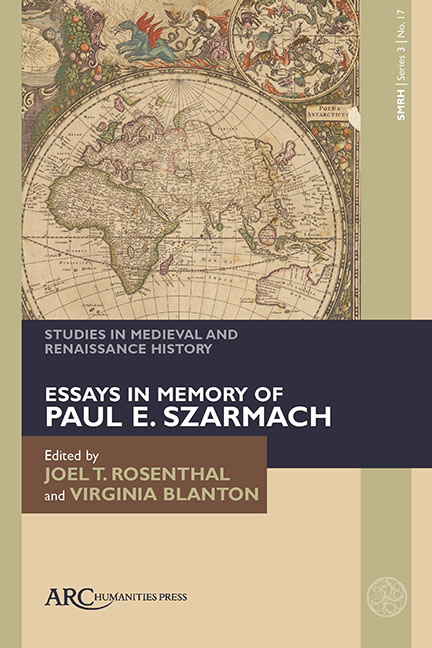Book contents
- Frontmatter
- Contents
- List of Illustrations
- Introduction
- Memories of Viking Age Cultural Contact: England in the Íslendingasögur
- Expressions of Cultural Disability: Navigating (Non)Normativity in the Hebrew–Italian Melekh Artus (King Artus)
- “All the rancour and enmity between us”. The War Between Richard, Earl Marshal, and King Henry III: Its Origins and Resolution
- Royal Consumption and Gifts of Deer in Thirteenth-Century England
- Travers and Trappe in the Palace of Pandarus: A Note
- Benedictine Devotion to England’s Saints: Thomas de la Mare, John of Tynemouth, and the Sanctilogium in Cotton Tiberius E. i
- The Rise of Admission by Apprenticeship Among the Freemen of Norwich, 1365–1415
- Nuns on the Run, or the “Sturdy and Wilful Dames” of Syon Abbey and their Disobedience to the Tudor State ca. 1530–1600
- Taking the Tour: Heritage Management in A Connecticut Yankee in King Arthur’s Court
Memories of Viking Age Cultural Contact: England in the Íslendingasögur
Published online by Cambridge University Press: 13 February 2024
- Frontmatter
- Contents
- List of Illustrations
- Introduction
- Memories of Viking Age Cultural Contact: England in the Íslendingasögur
- Expressions of Cultural Disability: Navigating (Non)Normativity in the Hebrew–Italian Melekh Artus (King Artus)
- “All the rancour and enmity between us”. The War Between Richard, Earl Marshal, and King Henry III: Its Origins and Resolution
- Royal Consumption and Gifts of Deer in Thirteenth-Century England
- Travers and Trappe in the Palace of Pandarus: A Note
- Benedictine Devotion to England’s Saints: Thomas de la Mare, John of Tynemouth, and the Sanctilogium in Cotton Tiberius E. i
- The Rise of Admission by Apprenticeship Among the Freemen of Norwich, 1365–1415
- Nuns on the Run, or the “Sturdy and Wilful Dames” of Syon Abbey and their Disobedience to the Tudor State ca. 1530–1600
- Taking the Tour: Heritage Management in A Connecticut Yankee in King Arthur’s Court
Summary
ENGLISH HISTORIES AND chronicles of the Viking Age (ca. 793–ca. 1066) are clear on the presence of Scandinavians on English shores. In these, Anglo-Scandinavian cultural interaction is usually characterized by conflict, defined by the actions of viking raiders and marauding Scandinavian armies, by their conquests and settlement in England's east and north. However, this is a one-sided perspective. There is no comparable Scandinavian record for the period. The Scandinavian cultures which contributed to the viking phenomenon left little record of how they self-identified or perceived their own actions. Nonetheless, it may be possible to reconstruct some sense of a Scandinavian perception of Viking Age cultural contact with England from later texts. Scandinavian literacy and the writing of the Scandinavian past flourished from the late-twelfth century, and Iceland was a locus for this activity. One corpus of texts which takes a particular interest in the events of the Viking Age is that of the Íslendingasögur (sagas of Icelanders). The Íslendingasögur comprise some forty-odd texts, most authored in the thirteenth century, all written in Old Norse-Icelandic vernacular, that relate the lives of Iceland's leading figures and families from the time that Scandinavian settlers arrived on the island ca. 870, through to the mid-eleventh century. While these are stories couched in literary conventions that make them difficult as historical sources, they nonetheless purport to be histories. Íslendingasögur narratives frequently intersect with historical events and figures of the Viking Age North Sea world, and this extends to England. Norwegians and Icelanders were, according to the Íslendingasögur, common visitors there, the corpus recording no fewer than thirty such journeys.
This study surveys Íslendingasögur references to England, categorizing the intent of the cultural contact they imply. Here, travel to England is rarely characterized as “viking,” but tends to be in aid of trade and commerce with, travel to, or settlement within, established communities. Where such activity does take on a martial aspect, as in the adventures of the skáld Egill Skallagrímsson, Bjǫrn Hítdoelakappi, and Gunnlaugr Ormstungu, the Icelanders usually take on a role in service to the English king, rather than as an antagonist or aggressor.
- Type
- Chapter
- Information
- Studies in Medieval and Renaissance History series 3 volume 17Essays in Memory of Paul E. Szarmach, pp. 1 - 26Publisher: Amsterdam University PressPrint publication year: 2023



